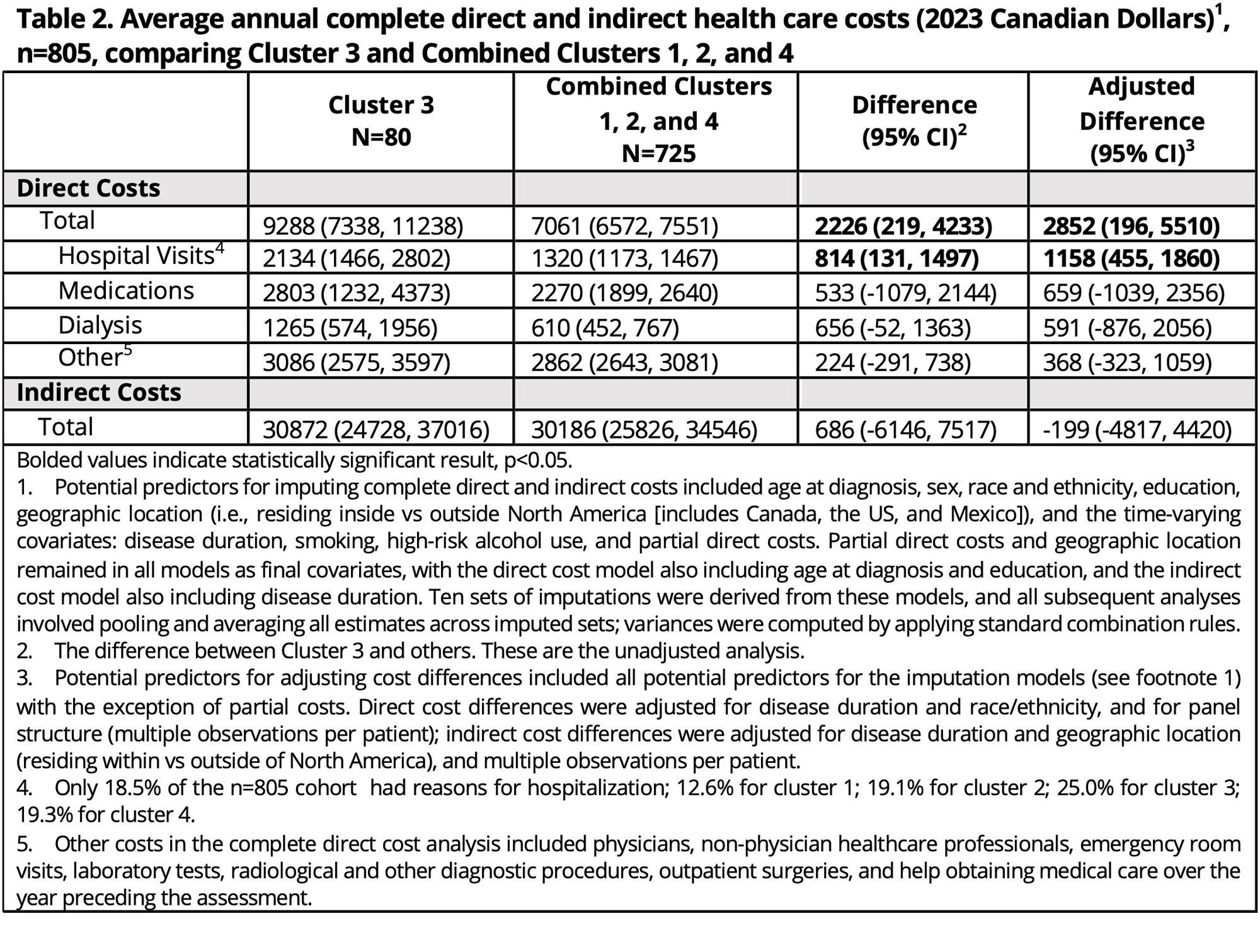Session Information
Date: Tuesday, November 14, 2023
Title: (2257–2325) SLE – Diagnosis, Manifestations, & Outcomes Poster III
Session Type: Poster Session C
Session Time: 9:00AM-11:00AM
Background/Purpose: Using machine learning, we identified 4 patient clusters based on longitudinal autoantibody profiles in an international SLE inception cohort, which were predictive of disease outcomes (Ann Rheum Dis 2023). We now compare direct and indirect costs between these SLE clusters to elucidate healthcare utilization patterns in SLE.
Methods: Patients fulfilling the 1997 Revised ACR SLE Classification Criteria from 33 centres (11 countries) were enrolled within 15 months of diagnosis and clustered by k-means using longitudinal 29 ANA immunofluorescence pattern and 20 autoantibody profiles. Data were collected annually on health care use (i.e., hospitalizations, medications, dialysis, and selected procedures, as well as SLE antibodies, organ involvement, activity [adjusted mean SLEDAI-2K] and medication use), supplemented by data on additional resource use and lost work-force/non-work-force productivity in a patient subset. Multiple imputation was used to predict all missing values for the patients in the full cohort who did not provide direct/indirect costs for all observations. Health care use was costed using 2023 Canadian prices and lost productivity using Statistics Canada age-and-sex specific wages. Average annual costs over follow up were compared between clusters using multivariable regressions, adjusting for significant predictors for direct and indirect costs.
Results: Of 1800+ patients enrolled in the SLICC cohort, 805 subjects were included in the SLE clusters and provided cost data (Table 1). Mean follow-up time for the entire cohort was 12.3 years (range 2.9-21.6 years) and similar across clusters. There were no clear differences in direct and indirect costs and component costs between clusters 1 (high frequency of anti-Sm/anti-U1RNP, predictive of high cumulative disease activity and immunosuppressant/biologic use), 2 (low autoantibody reactivity, predictive of low disease activity and immunosuppressant/biologic use), and 4 (multiple autoantibody reactivities, predictive of high disease activity). Thus, these 3 clusters were combined and compared with cluster 3 (highest frequency of all antiphospholipid antibodies [IgM/IgG anti-cardiolipin, -ß2GP1, -PS/PT, IgG anti-ß2GP1D1, lupus anticoagulant], predictive of seizures and mortality) using multivariable regressions. Cluster 3 had higher total direct costs than clusters 1, 2, and 4 combined ($9288 vs $7061; adj. diff. $2852 [95%CI $196, $5510]), particularly for hospitalizations ($2134 vs $1320; adj. diff. $1158 [95%CI $455, $1860]) (Table 2). Cluster 3 had significantly more hospitalizations for thrombotic/cardiovascular (CVD) events compared to combined clusters (2-sample test of proportions, 22.7% vs. 4.1%, diff. 18.6% [95%CI 6.0%, 31.3%]) (Fig1).
Conclusion: Machine learning based on autoantibodies alone identified a patient cluster with high antiphospholipid antibody frequency who incurred the greatest direct costs, a high proportion driven by hospitalizations due to thrombosis/CVD-related events. Even clusters with severe SLE did not incur such high cost, suggesting thrombotic and antiphospholipid-related complications are important contributors to the economic burden of SLE.
To cite this abstract in AMA style:
Choi M, Costenbader K, Fritzler M, St. Pierre Y, Urowitz M, Hanly J, Gordon C, Bae S, Romero-Diaz J, Sanchez-Guerrero J, Bernatsky S, Wallace D, Isenberg D, Rahman A, Merrill J, Fortin P, Gladman D, Bruce I, Petri M, Ginzler E, Dooley M, Ramsey-Goldman R, Manzi S, Jonsen A, Alarcón G, van Vollenhoven R, Aranow C, MacKay M, Ruiz-Irastorza G, Lim S, Inanc M, Kalunian K, Jacobsen S, Peschken C, Kamen D, Askanase A, Buyon J, Clarke A. Direct Health Care Costs Differ by SLE Autoantibody Machine Learning Clusters in an International Inception [abstract]. Arthritis Rheumatol. 2023; 75 (suppl 9). https://acrabstracts.org/abstract/direct-health-care-costs-differ-by-sle-autoantibody-machine-learning-clusters-in-an-international-inception/. Accessed .« Back to ACR Convergence 2023
ACR Meeting Abstracts - https://acrabstracts.org/abstract/direct-health-care-costs-differ-by-sle-autoantibody-machine-learning-clusters-in-an-international-inception/



